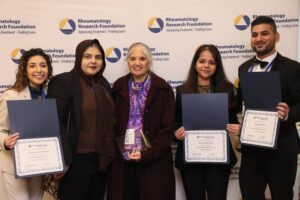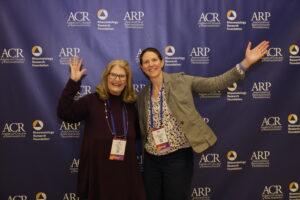
Recipients from Louisiana State University, Shreveport, received the 2024 Foundation Fellowship Training Award and Choose Rheumatology Scholarships. (Click to enlarge.)
The Association of Rheumatology Professionals (ARP) and the Rheumatology Research Foundation contribute to rheumatology in amazing ways. Over the past two years, I have worked closely with the presidents of these organizations: Adam Goode, PhD, PT, DPT, and Liana Fraenkel, MD, and their staffs. Seeing the commitment and energy they have for their mission has given me an even greater level of appreciation for the work being done by these groups.
The shared interest all three of our organizations have in improving the lives of those with rheumatic disease reflects the close links throughout our rheumatology community. Both the ARP and Foundation are celebrating milestone anniversaries this year, providing an even greater reason to recognize the important work they do to advance rheumatology.
The ARP
The ARP is celebrating its 60-year anniversary. It was founded in 1965 with a mission to improve outcomes for patients with rheumatic diseases through interprofessional collaboration. The ARP represents more than two dozen disciplines specializing in rheumatology, including advanced practice nurses, nurses, occupational therapists, physical therapists, psychologists, social workers, epidemiologists, physician associates, educators, clinicians, researchers, research coordinators and office staff.
Membership
ARP membership continues to rise, now including more than 1,800 members. A recent innovation was the Small Team Membership model (https://rheumatology.org/join-acr-arp-community), with a team consisting of 4–15 members and no more than one physician.
Volunteer opportunities

ARP volunteer leaders Annelle Reed, CPNP, MSN, and Heather Benham, DNP, APRN, CPNP-PC, celebrate rheumatology at ACR Convergence 2024. (Click to enlarge.)
In addition to leadership positions on the ARP Executive Committee, the ARP has four committees/subcommittees. The:
- Interprofessional Practice & Management Committee ensures that all ARP educational products and programs meet the practice needs of the disciplines in its membership;
- eLearning Subcommittee oversees the ARP online rheumatology education portfolio;
- Nominations and Appointments Committee reviews nominations for ARP elected and appointed volunteer positions; and
- Annual Meeting Planning Subcommittee (AMPC) develops sessions at ACR Convergence to meet the needs of ARP members and collaborates with the ACR AMPC to develop an integrated and seamless program.
The two joint ACR/ARP committees are the:
- Committee on Research. Many ARP members conduct research, providing valuable insights into the committee’s emphasis on research conduct and training; and
- Membership & Awards Committee. The ACR and ARP presidents elect co-chair this committee, focusing on member engagement and nominations for the ACR and ARP awards programs.
Having the ARP voice reflected in each aspect of the ACR is important—from the Board of Directors to every ACR committee, and also the Foundation. ARP members can learn more about these opportunities on the ACR website (https://rheumatology.org/volunteer).


